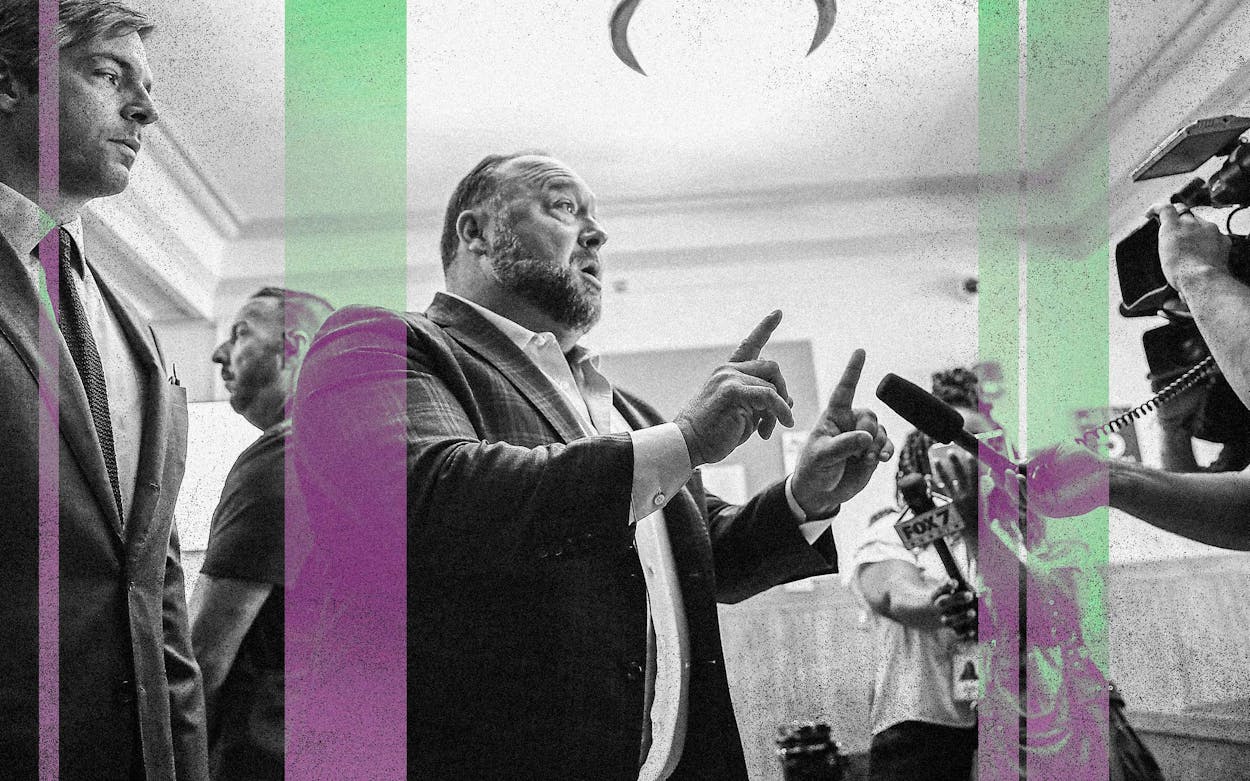On the first day of testimony in the first of three trials to determine the damages that Alex Jones and his Free Speech Systems LLC owes to the parents of children murdered in 2012 at Sandy Hook Elementary School, the host decided to hold an impromptu press conference in the hallway outside the courtroom during the first break of the day. There were cameras there, after all, and he wanted to be on them.
Jones ranted, in his trademark gravel-voiced growl, that the entire affair was an attempt to curtail his First Amendment rights. “This is the weaponization of the judiciary,” he intoned. “This is a witch hunt. This is a show trial. This will go down in history as one of the greatest show trials in history—not just here, but even in places like Nazi Germany.” It echoed a concern expressed (albeit more politely) by a number of prospective jurors on Monday, when they said they would have a difficult time participating in the trial because, as multiple folks put it, “I believe in free speech.”
Covering Jones’s defamation cases puts a reporter in an unusual position. Purveyors of disinformation and outright lies, which Jones undeniably has been over most of his career, always make our jobs harder. They erode trust in media broadly and confuse the public in ways that make it harder to convey accurate information. At the same time, no journalist is thrilled to venture down the sort of slippery slope that can result when subjective parties—a judge and a jury—weigh in on First Amendment issues. Even if you agree that Jones defamed the Sandy Hook parents when he said they were actors who fraudulently claimed to have murdered children, and even if you agree that those claims were intended to cause those parents emotional distress because Jones was feuding with them and his audience liked to hear him say that stuff, watching a lawyer make those arguments is nonetheless uncomfortable. How long before someone who doesn’t like something I’ve written tries to put me on trial?
But in the case of Heslin v. Jones, which is currently being heard in Austin, those First Amendment questions are less thorny—because, ultimately, they don’t exist at all.
They might have existed, however, had Jones mounted a full defense in the various Sandy Hook cases over the course of the past three years. But the jurors in the Austin courtroom aren’t there to determine whether Jones’s speech was protected or not. That decision was made by Judge Maya Guerra Gamble in a default judgment, which is a ruling that, because the defendant failed to comply with the discovery orders and other aspects of the evidentiary and pretrial process that allow both parties to make their case, the court finds for the plaintiff. By choosing not to provide documentation, videos, and other materials ordered by the judges (the initial judge retired midway through the case), Jones and his legal team—a group that has included a revolving door of nearly a dozen attorneys, most of whom lacked experience in defending First Amendment cases—also declined to mount a First Amendment defense of his actions.
Because there’s a default judgment, which is rare in a case of this nature, the judge and jury don’t have to weigh the complicated questions of whether speech is protected; the judge can determine that if you aren’t willing to fully participate in the court process, it must be because you did what you’re accused of. That’s what happened in the three cases in Judge Gamble’s courtroom, as well as in the additional cases that Jones also lost by default in Connecticut. Most speech is protected by the First Amendment, including most of Jones’s speech—but defamatory speech is not, and Jones failed, over the course of several years, in multiple cases in two states, to provide the court with the information that would allow jurors to determine whether the First Amendment gave him the right to say the things he said about Sandy Hook.
Jones has claimed in the months since the default judgments were issued that he’s been railroaded. Both in depositions and on his show, he’s offered up variations of a line he delivered on Tuesday in the hallway of the fifth floor of the Travis County courthouse: “I thought you’re innocent until proven guilty, and the judge said, ‘This is a special case, I say Alex Jones is guilty, and you’re going to say how guilty he is.’” But now, all that’s left to decide is how much damage Jones did to the plaintiffs—and how much he should be punished—for actions that he chose to not properly defend.
The case would be a lot more interesting if Jones had mounted a full defense of his speech, and the judge or jury could have weighed in on whether his speech was indeed protected before determining what damages, if any, were called for. Despite positioning himself as a warrior for the First Amendment, Jones blew his chance to fully participate in that particular battle.
- More About:
- Politics & Policy
- Austin








